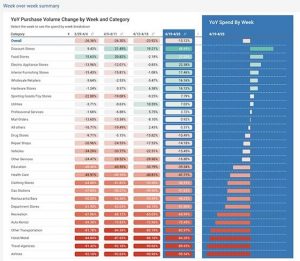For the past two weeks many of my evenings have been spent at the 2020 Olympics. I rarely watch TV, let alone sports. However, I love watching people go out to try to be the best in the world. Even more so because they are rarely household names, often competing in a sport the world only cares about every four years. As a former collegiate rower with short-lived national team aspirations, I know just how much talent, work and sacrifice it takes to make it to that venue. That the vast majority of athletes will spend more than they will ever make to get there. They do it for the love of their sport and the desire to compete at the highest level.
The desire to be really good at something, and work hard to improve, is a trait I actually interview for at WeSpire. I often ask candidates to tell me something they are really good at or aspire to be really good at, their “superpower” so to speak. Answers have included an engineering candidate who regularly bowls 300s, a marketer who is active in Toastmasters to hone public speaking skills, to a potential CS rep who grew up in a large family and is excellent at diffusing conflict. My follow up is to ask them what they do to get feedback, learn and improve on that superpower. I find the broad range of skills and competencies fascinating, but what I’m looking for is that innate desire for continuous improvement.
Not all leadership traits are innate
Becoming a strong leader takes a dedication not that dissimilar from training for the Olympics. Some people have more natural leadership talents than others, but after getting to a certain point on talent, the rest takes hard work. A willingness to seek and learn from feedback. A desire to get better at core skills, whether strategy or negotiation or hiring and coaching teams. Efforts to reduce the impact of the weakest links in your performance. To stay sharp on the latest innovations or trends. Leadership also requires showing up consistently, day after day, to demonstrate those skills. You don’t get to just stop leading, unless you quit.
Leadership also has its Olympic moments, times when every single thing you’ve learned and practiced needs to come together to successfully navigate a situation. It could be a crisis, like what James Burke faced with the Tylenol poisonings at Johnson & Johnson. It could be an opportunity fraught with high stakes decisions and negotiations, like raising a round of capital at a startup. The difference is that these situations don’t always emerge on a predetermined schedule. As a leader, you may be called on to perform at your Olympic level at any moment.
Mental conditioning
As a result, the best leaders I know “train” like world-class athletes. They surround themselves with other leaders to learn from. They read voraciously. They seek feedback early and often. They rehearse and practice. They often have coaches to help navigate the personal and professional complexities of leadership.
Yet I think this work is often invisible. Training to be a good leader doesn’t really lend itself to a highlight reel. As a result, many people, including those put into leadership roles, don’t realize how much work is necessary to be good at it. Others think they aren’t “cut out” for leadership, not realizing it’s something that can be learned.
One of the greatest gifts that leaders can give their teams is a window into what they are doing to be a better leader. Share what you are learning when you read. Talk openly about coaching or peer forums. Name the weakness you are working to mitigate. Discuss your habits. Encourage feedback on what else you could be doing.
By demystifying the work that goes into leadership, I believe we will encourage more people to lead and to aspire to be better leaders. Given the complexities that we face over the coming years, those better leaders will be critical to creating a better working world.
Business & Finance Articles on Business 2 Community
Quote of the Week: “Success isn’t always about greatness. It’s about consistency. Consistent hard work gains success. Greatness will come.”
Dwayne “The Rock” Johnson
(44)
Report Post








